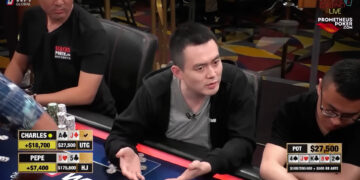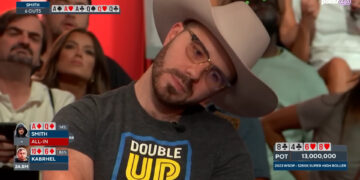I’m going to cover what I view as the three most obvious poker tells in this article. Prior to getting to the most obvious tells in Texas Hold’em Poker and how they relate to poker strategy for tournaments, I have some interesting thoughts.
When you play in poker games, do you only look at the cards? Do you ever look at the fingernails of the player in Seat 3? Did you happen to notice that they’re dirty? If someone comes to a poker game with dirt caked in their fingernails, I can assure you that they’re not rolling in the dough and they’re going to play scared.
You might think this is about personal hygiene. You’re correct, but not many wealthy people bypass cleaning their fingernails. It’s not their style. So, yes, someone’s fingernails is a tell. This is a player you want to attack when you have them on top pair and there are scare cards on the board.
Casually Observe Poker Tells

Did you notice that the lady in Seat 7 is wearing a $10k engagement ring? Money isn’t a concern to her. At the same time, as a female poker player, she doesn’t want to make it easy for you. She’s also highly competitive (how do you think she landed that ring?)
How about the guy sitting right next to you? He’s playing online poker on his phone between hands. Here’s one of those poker tips you won’t find anywhere else: Anyone who plays online poker while playing poker tournaments is addicted to the game. This means they likely know the game inside and out but they’re not fully focused. This usually leads to more technical play. They will be easy to read. You will know when to apply pressure and when to back off.
Essentially, I could say that those are three poker tells in Texas Hold’em Poker, but they wouldn’t be obvious. I’ll get to the three most obvious poker tells in poker below. But first, please allow me to finish what I was going to say about this section earlier.
It relates to being observant, which is why I brought up those three examples. Only the observations I was referring to didn’t pertain to the poker table; they pertained to this article. Did you notice something that was off anywhere?
Quotation marks indicate that two people are speaking with one another. The conversation I wrote about above was an online conversation. Nobody was talking. As an example, it should have been written like this…
Me: What do you mean?
There are no quotations. Are you paying that much attention to detail at the poker table? If not, try to focus a little more on your opponents. Watch, listen, and learn, but always make it look like you’re not paying attention. As far as listening, you usually don’t need to ask any questions. Someone else at the table will do it for you.
You will often find out where someone lives, how they got there, what they do for a living, they’re relationship status, and what kind of dog they have. All of this information can be put to use at the poker table. Don’t believe me?
Let’s say the player in Seat 3 asked the player in Seat 2 all those questions. We learn that the player in Seat 2 lives in rural Kentucky (not likely to be wealthy), they hitched a ride from a friend (doesn’t own their own car), they work as an EMT (not much time to focus on poker), they’re married (definitely not much time to focus on poker when combined with EMT), and they have a pointer (he hunts with the dog on his free time).
Put all the pieces of the puzzle together and he is there for fun. That should be respected, but you should also attack this player at every opportunity. You might think that’s mean, but he is there to take your money. If he wins a pot, do you think he’s going to say, “Nah. It’s okay. You seem like a good guy. Let’s split it even though I had the nuts and you had second-best.”
Yeah … No. Not going to happen.
Before getting to those three most obvious poker tells in Texas Hold’em Poker, I would first like to mention that 19% will be published right here on Poker Journal. This pertains to the digital version. The paperback version will be on Amazon, and the audio version will be on Audible and iTunes.
But this version will be FREE! If you’re looking for any kind of hint on what to expect: It’s non-fiction (that means it’s true) and it’s by far the strangest book I have ever written. It will also help your poker game, but not in the way you think. Then again, I have to see how the rest of the book plays out (27 more tournaments to go). Sample Chapter from 19%.
Now let’s get to the three most obvious poker tells in poker. The following tells can be applied to poker tournaments as well as traditional poker games. They should also be included in your poker rules for winning.
Quiet & Still

This happens all the time, over and over again. When there is someone at your table who was just talking, taking a sip of a drink, looking at his phone, or watching television, and he is suddenly as still as a statue and not saying a thing, he has woken up with AA or KK.
It’s funny because he is changing his behavior so he doesn’t give anything away, not realizing that changing his behavior is exactly what is giving himself away. Through the years, and in many poker tournaments, I have saved a lot of chips with this read. I have had spots where I have KQ, AK, QJs in position and folded to a raise because I saw the change in this person’s behavior.
It’s always instantaneous, which makes it obvious. I’m more likely to call with a pocket pair because of the opportunity to stack my opponent if I flop a set (they’re not folding AA or KK).
Since you’re reading this, and now that you know this information, you can play off of it in two ways.
One, the next time you’re dealt AA or KK, be conscious of this pattern and instead act just like you were acting before you looked at your hole cards. Don’t become more talkative. That is also a tell, and most people are terrible actors, much worse at it than they think. True acting is not acting.
Two, the next time you’re dealt a hand like 97s and feel like making a move, go very still and quiet as explained above, which will make an observant opponent think you have AA or KK. Now you can win the hand in two different ways.
If an ace or king hits the flop, always c-bet here. It’s a traditional poker bluff, but it’s going to be even more effective because you made it appear as though you’re holding AA or KK. This is also a good spot for a check-raise-bluff against a strong player (a better route against that kind of player) because he’s not going to believe that you would bet out on a flopped set and will put you to the test. But if you check-raise, he’s gone.
The other way to win this hand is to smash the board with 97s. If that happens, they are never going to see it coming and you have the potential to scoop a massive pot. Here’s the tricky part. You actually want to be up against strong players in this situation. Weaker players will not evaluate the situation and put you on a hand range. Strong players will attempt to figure out what makes sense. Since you did something that didn’t make sense, they are going to lose a lot of chips if you hit.
The added benefit here is that strong players are more likely to go on tilt after an event like this. You outplayed them, which is going to bruise their Ego. There are strong players that won’t be fazed. In fact, the best of the best will respect it. If you don’t know who those players are, I’m sorry, but I can’t reveal them.
Fire! Fire!
If someone fires fast on every betting round, the answer is very simple. They’re either attempting a poker bluff or they have a marginal hand. The key for you is to pick the right spot to raise them out of the pot. You DO NOT need to have a hand. I’m telling you that at least 90% of the time, they DO NOT have a monster here. But there are two factors to consider.
One, if there are other players in the hand, then you best slow down. I have made the mistake of outplaying an opponent without realizing that a third player was trapping me. You only want to use this play when it’s heads-up. The only exception is when you strongly believe the third player is weak.
Two, you better make sure that your raise is big enough to get a fold. If you don’t raise enough and he has a marginal hand, he’s likely to call. This is a problem. The first danger is that he can suck out on you on the next street. The second danger is that he might put you to the test on the next street.
At that point, you’re going to be in a situation. We don’t like to be in situations in poker tournaments. You want to keep our poker hands as simple as possible and methodically accumulate chips (and sometimes collect a ton at once). We don’t want to play poker hands where we begin to question if our read was on or off.
UTG Limps
The funny thing about poker tells is that they’re not universal. For example, if a bad player limps UTG (Under The Gun/First To Act), they’re not likely to have a strong hand. They’re trying to get away with seeing a cheap flop with a good (not great) hand. If it’s a strong player, there is a pretty good chance that they’re limp-raising with a monster.
They are more likely to attempt this if it’s an aggressive table. This way they get more value when they put in a massive raise (or jam it) when it comes back around to them. Everyone is likely to fold (if they’re wise). If someone calls, that’s fine too.
As always, there is another level here. Let’s say you’re at an aggressive table and the aggressive players at the table view you as a strong player. If you limp UTG, then they’re going to know what you’re doing. They’re going to fold pre-flop. There is no point in even limping because they will be wasting chips. Here’s the fun part.
The truth is that you did this with JTs because you knew how they would be thinking. Now you get a check from the BB and the BB also has you on a monster. Once again, you can now win the hand in multiple ways (while selling it well). If that board comes high in any way, you’re going to c-bet and likely take it down. If the BB remains involved, use caution. They could be trapping you.
This is much more likely if the flop comes low. It means they could have flopped two pair and they’re looking to get paid. But they will usually bet out with two pair. And they will usually check-call with a flopped set or draw.
Final Thoughts
Poker it’s a complicated game, but you can make it Enjoyable Complicated; It doesn’t need to be Stressful Complicated. If you focus on human beings, their behaviors, and their patterns, you are going to have an edge. Some people like to play math, but wouldn’t you rather have a very good idea of what your opponents are doing while also completely deceiving them? They can’t use math if they think you’re on a tropical island when you’re really in New York City.
If you buy-in to my approach, I cannot guarantee wins, but I can guarantee that nobody is ever going to figure you out. But there’s a catch. You WANT people to think they have you figured out. That’s when you know it’s working. This means you must put Ego to the side and say, “Yes, I am a predictable tight player.” Keep the evil grin to yourself in these spots. 🙂 See you at the WSOP!
♠ pokerjournal.org


















Discussion about this post